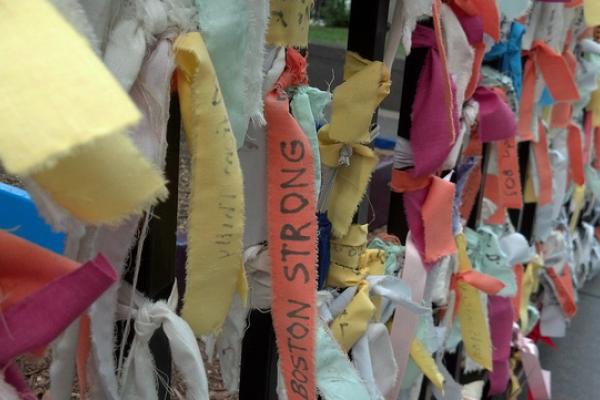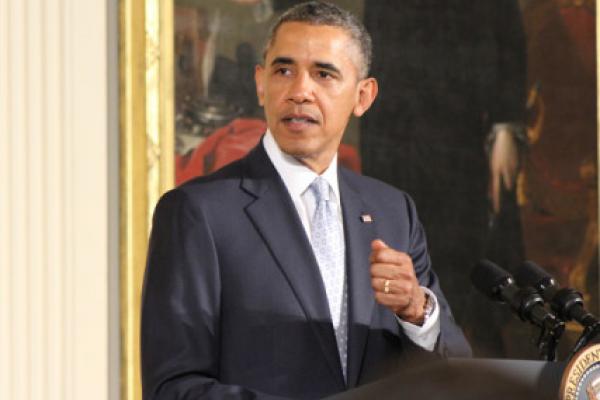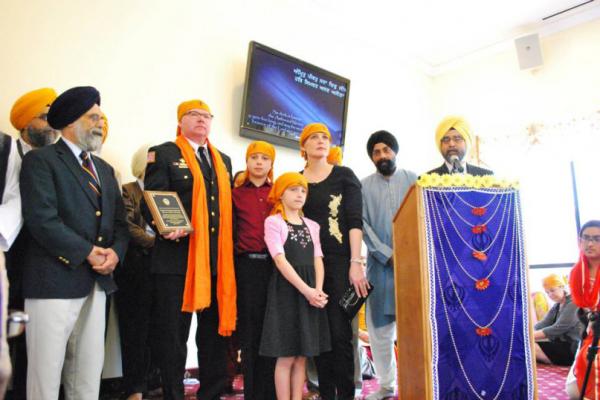My first marathon ever — 2003 in New York City — did not go according to plan. On the positive side, I would never have guessed that P. Diddy would be running the same marathon and at the same pace for much of it, providing an entertaining entourage to distract me from my exhaustion. On the negative side, my name, which I had taped to my tank top so the crowds could give me much-needed encouragement, quickly peeled off, and I was anonymous in the crowd. My plan had been to run that last mile to the mantra “you can do anything” or “you are power,” but instead, my legs barely moving and my husband and close friend no longer by my side, I chanted dejectedly to myself: “Never again, never again.”
I didn’t know what misery associated with a marathon really was, though, until I heard about the Boston Marathon bombings, which took place one year ago today. On this day, two young brothers set off two bombs at the end of the Boston Marathon. As we waited to understand the damage, I remember thinking about the juxtaposition of the runners’ feelings of accomplishment setting in just as shrapnel began to fly. Then I received the painful — even if relieving — news that my first cousin had been right at the finish line with her husband and baby (born a year ago exactly on that marathon Monday) and had escaped the violence only because the baby needed her nap. We eventually learned that three people were dead, hundreds were injured, and the two suspected perpetrators were associated with radical Islam. I felt disgust and horror.
Moments such as this challenge each of us to live up to the “better angels of our nature,” as President Abraham Lincoln put it. As has been borne out by various terrorist attacks around the globe, terrorism breeds fear — its intended consequence. Too often this fear becomes fear of a religious group. We, as Jews, know intimately the perils of a society surrendering to this type of fear.
Among the many images of the marathon victims that emerged shortly after the attack, I remember being most struck by the photographs of the injured victims, missing their once sturdy limbs, lying in hospital beds. For me, those images perfectly conveyed how our city was feeling at that moment. We had just had something ripped away from us. We were assaulted, grieving for our loss, and outraged that any human being could dare do this to us.
How would our injured victims respond? Within days, the answer was clear. They would remain resilient. Adrianne Haslet-Davis would dance again, now with a prosthetic limb. Never a runner before, Celeste Corcoran pledged to run a marathon, now on her two prosthetic limbs. And, shaken by the tragedy, Amanda North would quit her job and launch the dream of her own artisan business.
President Obama on Monday called for people of all faiths to deter gun violence and anti-Semitism, one day after a gunman killed three people at Jewish centers in suburban Kansas City.
“That this occurred now — as Jews were preparing to celebrate Passover, as Christians were observing Palm Sunday — makes this tragedy all the more painful,” the president said at his annual Easter Prayer Breakfast.
In the Garden of Gethsemane, Jesus utters his agonizing prayer, “Abba, Father, for you all things are possible; remove this cup from me; yet, not what I want, but what you want.”
Who among us hasn’t found ourselves in a situation where the inevitable seems impossible? Where the unavoidable seems unimaginable?
Who hasn’t said to God, in so many words, “Remove this cup”?
The most difficult thing in such a situation may be its crushing inevitability. You want to escape from your life, which suddenly feels like an oncoming train about to run you down. It is the shock you feel when you receive a frightening diagnosis from your physician. When you are laid off from a job. When a friend dies. When a relationship ends. You say to yourself, “This cannot be happening.”
Brian Murphy attended Catholic Mass regularly, both before and after he took 12 bullets while trying to defend a Sikh temple in Wisconsin from a gunman in 2012.
But he says the principles he’s learned from the Sikh temple have helped his recovery.
Now, a Maryland-based Sikh organization has honored the retired police officer for his service when a gunman killed six worshippers at the Sikh Temple of Wisconsin.
The Guru Gobind Singh Foundation, a Maryland-based Sikh advocacy organization, honored Murphy on Sunday — on Vaisakhi Day, a Sikh holy day — with a Sewa (service) Award, given annually to someone who has contributed to the Sikh community.
Twelve years ago we took our beloved Maltese dog, Moose, to the vet and came home without him. Moose was in the late stages of congestive heart failure, and many times each day he was wheezing and crying out in pain. While my daughter held the little dog, the vet gave him a shot. It was over very quickly.
Why don't we treat death row prisoners at least as well as we treat dogs?
"Secret Drugs, Agonizing Deaths" is the headline on an article in yesterday's New York Times. Back when executioners wielded axes, they tended to wear hoods so people wouldn't recognize them. Nowadays states still conceal executioners' identities — and much more.
In early April, the U.S. Navy unveiled its Mach 7 Magnetic Mangler, “a railgun straight out of Star Trek that can take out targets at 100 miles with a projectile flying at nearly 7,000 feet per second.” So far, the U.S. military has spent $240 million developing the railgun over a period of 10 years. CBS News reports that the railgun won’t go to sea until 2016, but one article, published in The Gazette, suggests that the U.S. military may have decided to show off the Magnetic Mangler in order to send a message to the Russian government.
In advance of the University of Wisconsin's recent “Resources for Peace” conference, a professor friend asked participants to consider whether the increasing competition for depleted global resources, for goods to meet essential human needs, would tend inevitably to make people less humane. She was thinking particularly about what she termed “the shrinking humanism” seen in dystopian novels and films that portray cruelty and violence among people who fear for their survival.
Easter Sunday marks the holiest, most exalted moment of the Christian year. In Easter services all over the world, trumpets and organs blast. Flowers transform churches with their brightness. Worship leaders boldly proclaim: “Christ is risen!” Congregations echo back: “Christ is risen indeed!” The cycle of celebration and repetition begins as it should — a festive proclamation of good news. In Christ God has overcome the powers of sin and death, freeing us to live with hope and promising us life. Not just life after death, but full life, divinely inspired life — life in the here and now.
Christ is risen! Christ is risen indeed!
Even in these festive moments, many people express insecurity regarding the quality of their own believing.







